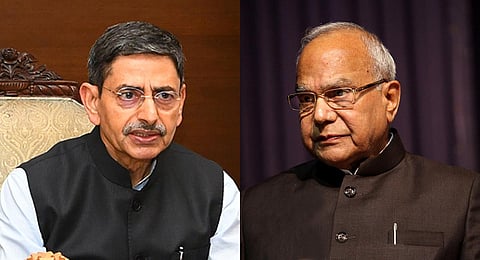SC expresses 'serious concern' as TN, Punjab governors draw flak for delaying assent to bills
NEW DELHI: India's top court pulled up the governors of Punjab and Tamil Nadu on Friday expressing "serious concern" over their withholding approval for bills passed by their respective state legislatures.
In the case of Tamil Nadu, the bench, comprising Chief Justice DY Chandrachud and Justices JB Pardiwala and Manoj Misra, highlighted that 12 bills were pending with Tamil Nadu Governor RN Ravi.
The court issued notice to the Centre in response to a writ petition filed by the state government.
"The issues raise a matter of serious concern," the top court noted.
Senior advocates Abishek Manu Singhvi, Mukul Rogatgi, and P Wilson represented the Tamil Nadu government during the hearing. Singhvi emphasized that key decisions, including prosecution sanctions, Tamil Nadu Public Service Commission appointments, and prisoner releases, awaited the governor's approval.
Singhvi argued that the issue was not isolated to Tamil Nadu, stating that "from Punjab to Tamil Nadu, the disease is spreading." He contended that states are forced to approach the Supreme Court with similar problems, emphasizing that the constitution does not permit the governor to act against the state government and remarked that Article 200 requires the governor to deal with bills "as soon as possible."
Senior Advocate P Wilson argued that the governor's actions defy the constitution, rendering the elected government and governor dysfunctional. Wilson proposed fixing a time frame for governors, similar to the six-week limit for the president under Article 91 of the draft constitution.
Wilson said 10 out of 14 TNPSC commission members' posts, including the chairman, cannot be filled because of the governor’s defiant attitude and beseeched the court to "save the people of Tamil Nadu."
The bench postponed further consideration to November 20, requiring the presence of the Attorney General for India or the Solicitor General of India for assistance.
'Playing with fire'
In the case of Punjab, the Supreme Court criticized Governor Banwarilal Purohit for not assenting to bills passed by the state assembly, stating, "You are playing with fire."
The bench questioned the governor's authority to term the assembly session as unconstitutional and asked the Punjab government why it adjourned without proroguing the budget session.
The court emphasized the need for democracy to function in the hands of both the Chief Minister and the governor, promising a short order to settle the law on the governor's power to give assent to bills.
It said the governor cannot indefinitely sit on the bills as he has restricted powers under Article 200 of the Constitution, which deals with the Raj Bhavan occupant's power to give or withhold assent to a bill or reserve a bill for the president's consideration.
On November 6, the court stressed that state governors, not elected representatives, must not ignore their responsibilities. It expressed concern over delays in governors acting on bills passed by state legislatures, directing Solicitor General Tushar Mehta to provide details of Governor Banwarilal Purohit's actions on the bills.
The Punjab government, alleging unconstitutional inaction, had moved the court, asserting that the delay had paralyzed the administration. The court had expressed concern over delays by various state governors in giving assent to key bills, especially in states ruled by opposition parties.
The Chief Justice questioned why governors only acted after states approached the Supreme Court, emphasizing that such a scenario had to end. He underscored the need for a resolution between the Chief Minister and the Governor without court intervention.
In the previous hearing, the Supreme Court had expressed concern over delay by various state governors in giving assent to key bills passed by the state governments, especially those ruled by opposition parties such as Tamil Nadu, Kerala, and Punjab, noticing a trend that these states are approaching the apex court's intervention.
"The governor must know that he is not an elected representative. He can withhold assent and send it back once. This is particularly true on money bills. Why should parties be required to move the Supreme Court to convene the House? We are the oldest democracy, and these issues must be sorted out between the Chief Minister and the Governor," the top court had remarked.

